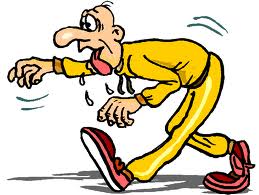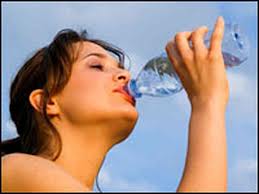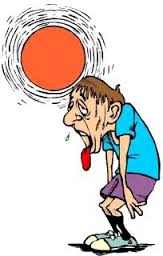The heat is on! Summer means trips to the beaches, picnics, and planning vacations with family, friends etc but on the other half, it also implies an increased risk of dehydration. With more time spent outside in the sun, there comes an increased risk of not drinking enough liquids. The high temperatures make it hard to summon the motivation to exercise outside, and more serious conditions like dehydration, exhaustion, and heat stroke can result when we are not prepared for the heat. Being aware of the signs of these illnesses and how to stay active while keeping your body at a safe temperature is an important part of being healthy during the summer heat.
Water is important to the body at all times, but especially in warm weather. It keeps the body from overheating. When we exercise, our muscles generate heat. To keep them away from burning up, our body needs to get rid of that heat. The main way the body discards heat in warm weather is through sweat. As sweat evaporates, it cools the tissues beneath. Lots of sweating reduces the body’s water level, and this loss of fluid affects normal bodily functions.
We sometimes fall into the trap of believing that just because we are in a water-filled environment, such as swimming or living in a high humidity area, we will be protected from dehydration but this is not always the case as we will still sweat from any physical activity we perform. Since sweat evaporates quickly at times we may notice it more in a dry area, but you will lose just as much water exercising in a wet environment as a dry one.
Symptoms of dehydration include:
- Fatigue
- Loss of appetite
- Flushed skin
- Heat intolerance
- Light-headedness
- Dark-colored urine
- Dry cough

As all of us know that most of your body is made up of water and there is no way it can function properly in its shortage. So, if we start to feel these symptoms, or notice them in others it is time to take a break and grab something to drink. The best way to beat dehydration is to drink before you get thirsty. If you wait until after you’re thirsty, you’re already dehydrated.
The following are some tips which may help you to stay hydrated.
- Drinking plenty of water before, while, and after exercise. This is essential when it’s hot out and when engaged even in low or mild exercise. Drinking water helps you to regain the water loss through sweat. Rehydration drinks or sports drink can also be consumed in atleast every 15 to 20 minutes when exercising for longer than an hour. These replace not only fluid, but also chemicals like sodium and potassium, which are lost through perspiration. Too much or too little sodium and potassium in the body can cause trouble. Muscle cramping may be due to a deficiency of electrolytes, such as sodium and potassium.

- Encourage children to drink extra fluids or suck on flavored ice pops, such as Popsicles. There should be at least 8 to 10 glasses or 2 litre of water intake every day.People with diabetes can face further challenges in maintaining an adequate level of hydration in hot weather, since diabetes can lead to an increase in the body’s excretion of urine when blood glucose levels are elevated.
- Coffee, colas, or other drinks that contain caffeine should preferably not be consumed as they increase urine output and make you dehydrate faster.
- Diets which are high on proteins content should be avoided. If a person is on a high-protein diet, it is essential to make sure that they drink at least 8 to 12 glasses of water each day.
- Stop working outdoors or exercising if you feel dizzy, lightheaded, or very tired. Enjoy outdoor activities during the cooler time of the day. Early morning until 10am or after 5pm is the best time to have fun.
- Alcoholic beverages, including beer and wine are not recommended. These fluids tend to pull water from the body and promote dehydration. Fruit juice and fruit drinks may have too many carbohydrates, too little sodium, and may upset the stomach
- Wear one layer of lightweight, light-colored clothing when you are working or exercising outdoors. Never exercise in a rubber suit.
Whatever method you use to stay hydrated, you will enjoy the extra health benefits from this simple change. Dehydration can become dangerous if left untreated, and is easily preventable. Whenever you are enjoying the outdoors this summer make sure to pack plenty of water to help make sure you are staying safe and healthy.
Untreated dehydration can lead to three worse types of heat illness:
- Heat cramps: Painful cramps of the abdominal muscles, arms, or legs.
- Heat exhaustion: Dizziness, nausea, vomiting, headaches, weakness, muscle pain, and sometimes unconsciousness.
- Heat stroke: A temperature of 104 or higher and severe symptoms, including nausea and vomiting, seizures, disorientation or delirium, lack of sweating, shortness of breath, unconsciousness, and coma.
Both heat exhaustion and heat stroke require immediate care. Heat stroke is a medical emergency that, when untreated, can be deadly.
At the end, I would like to say that staying properly hydrated starts with a lifestyle change. Eight glasses of water is the recommended amount you need to stay hydrated, but this is only a guide. If you are active or more working than you may need more to stay healthy.
Summertime is a carefree time and a great opportunity to begin new healthy habits. Keep your days sunny by staying prepared, aware, and hydrated!

Leave a Reply